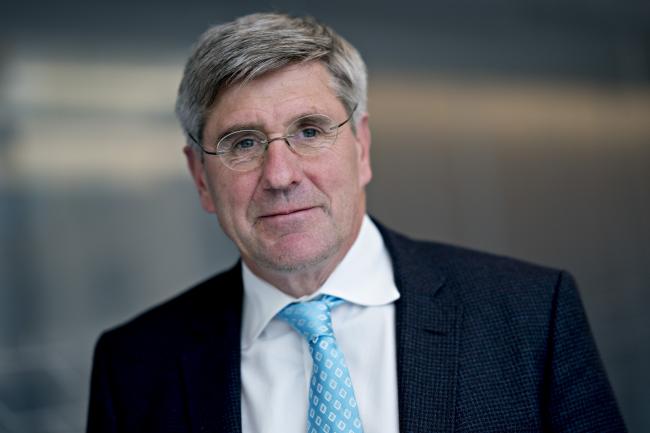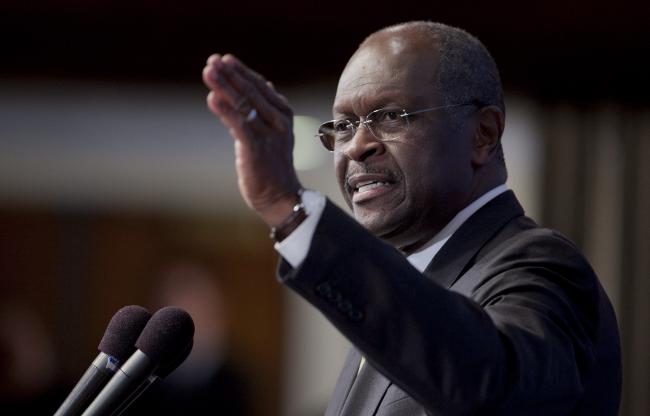(Bloomberg) -- Herman Cain’s withdrawal from consideration for a seat on the Federal Reserve Board has intensified the scrutiny of President Donald Trump’s other controversial choice for the central bank, economics writer Stephen Moore.
Like Cain, Moore has yet to be formally nominated for the board. His background check continues, and Trump hasn’t signaled he’s reconsidering, according to a person familiar with the matter.
Yet Trump’s chief economic adviser, Larry Kudlow, said last week that the White House is considering other candidates for both seats on the board.
Moore’s candidacy has suffered as reporters have pored through his voluminous writings, public statements and legal records. On Monday, CNN reported that Moore had written columns for the National Review more than a decade ago that derided women. Moore told the network that the columns were a “spoof.”
“Staying in despite the slime campaign,” Moore said in a text message on Monday, when asked whether he intended to remain in consideration for the Fed. He didn’t respond to inquiries Wednesday morning.
Trump has long raged at the central bank and the chairman he appointed, Jerome Powell, over its 2018 rate increases and, more recently, the Fed’s plans to gradually shrink its portfolio of billions of dollars of Treasury bonds it acquired to fight the 2008 financial crisis. One solution, from the president’s point of view, is to appoint political loyalists like Cain and Moore to counterbalance Powell.
Bank Politicization
That has caused concern over the the possible politicization of the bank, which answers to Congress and is intended to have independent control over monetary policy.
Moore is a Heritage Foundation fellow and was an economic adviser to Trump’s 2016 campaign, while Cain started a super-PAC last summer to “fight for the president’s policies and freedom agenda,” according to its website.
White House officials didn’t respond to requests for comment on Moore Tuesday and Wednesday.
Cain, in a column posted Monday on WesternJournal.com, said he was withdrawing from consideration after realizing the scale of the pay cut he’d face. His decision came four days after an Atlanta woman, Ginger White, held a news conference to resurface allegations, first made when Cain sought the 2012 Republican presidential nomination, that she’d had a 13-year extramarital affair with him.
Cain ended his campaign amid accusations by White and separate allegations of sexual harassment. He denied all the accusations.
White said she was willing to testify under oath about the relationship to the Senate Banking Committee, which must approve appointments to the Fed board, and would prove it happened by identifying parts of Cain’s anatomy “that are not visible.” Cain again denied the affair.
Moore’s controversies are less salacious.
Inconsistent Positions
He was found in contempt of court after he failed to pay his ex-wife some $300,000 in alimony after their 2010 divorce, and the Internal Revenue Service won a judgment against him for about $75,000 in unpaid taxes and penalties in 2018. He has said the tax debt resulted from an accounting error and that he’s contesting it.
Moore’s candidacy for the Fed has been publicly criticized by some economists, including Greg Mankiw, a Harvard professor who was chairman of the White House Council of Economic Advisers under President George W. Bush. Mankiw said Moore doesn’t have the “intellectual gravitas” to be confirmed.
Moore’s views on monetary policy are inconsistent and appear to fluctuate depending on whether his party controls the White House.
He wrote in December that Trump should fire Powell for raising interest rates, but in 2008 he called on the Fed to raise rates, instead of cutting them, ahead of the financial crisis that precipitated the worst recession in a generation. He also criticized the Fed for cutting rates under President Barack Obama.
He called the nation’s debt “inherently evil” in December 2014, while Obama was president, but has gone quiet on the issue since Trump took office. The president has backed fiscal measures that have helped inflate U.S. public debt to more than $22 trillion, or about 82 percent of gross domestic product.
Moore has mused about returning the U.S. to the gold standard, an idea considered unworkable by mainstream economists. He insisted in a CNN interview on April 11 that he didn’t support a return to the gold standard, whereupon the network played a series of past statements in which he advocated for it, most recently in 2016.
Moore explained that his views had evolved, and “that a gold standard would certainly be better than we have right now, but I think there’s a much better system we could put in place, which would not just look at gold, but all commodities. I think they’re a very good forward looking indicator for where prices are going.”
Nonetheless, Moore’s candidacy for the Fed appears more viable than Cain’s simply because support for him in the Senate hasn’t yet cratered. Four Republican senators said by April 12 they would oppose Cain’s confirmation, enough to block him from a Fed seat assuming no Democrats voted for him. No Republicans have publicly voiced opposition to Moore.

